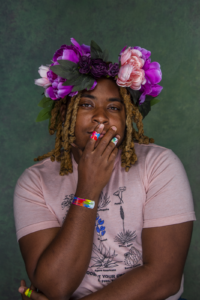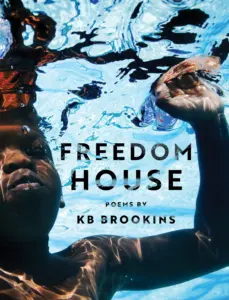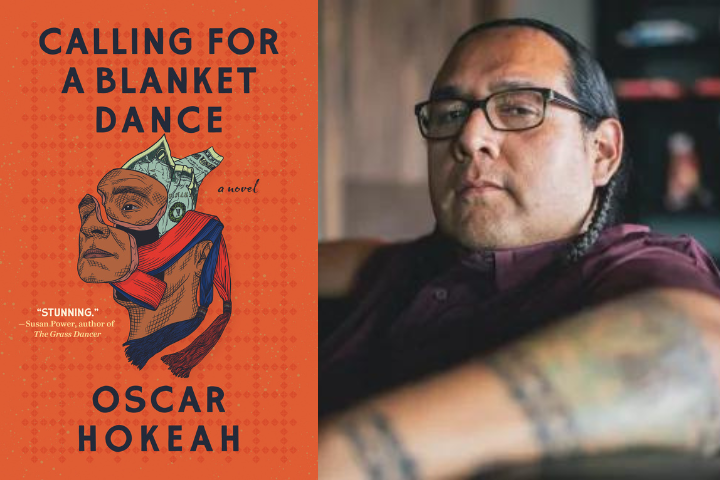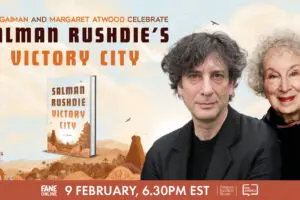In their new poetry collection, Freedom House (Deep Vellum, 2023), former 2021 PEN America Emerging Voices Fellow KB Brookins dives into an exploration of transness, the politics of the body, gentrification, sexual violence, climate change, masculinity, and Afrofuturism—bringing the seemingly-disparate subjects together through a current of music-inspired poetry and the narrative of their own transition journey.
In conversation with PEN America’s Los Angeles intern, Emily Chen, Brookins spoke about what freedom means to them, their relationship with writing and teaching, and their love for poetry as a genre that incorporates its past in present work. (Amazon, Bookshop)

1. Tell me about the beginning of your relationship with reading. When did you develop a passion for reading, and what were you reading at that time?
I’m not sure that I saw reading as more than a thing required for school until I read a YA book called Tears of a Tiger by Sharon M. Draper in 7th grade. Truly, I’m not sure that I read anything but textbooks until then. After I knew that there was such a thing as reading for leisure (rather than purely educational reading), I became intrigued. I’d like to think that I read picture books and things as a little-little kid, but Tears of a Tiger is the first thing I read that a) I remember, and b) that felt relevant to my life outside of school.
2. In your education as a writer, is there a teacher or lesson you recall as essential?
For sure! The teacher that first introduced me to poetry was Mrs. B Williams, my 7th-grade English teacher. The teacher that encouraged me to write poetry of my own was Ms. Elaine Duran, my 9-12th grade Spanish teacher, and mother of the award-winning poet/teacher/speaker Natasha Carrizosa. With their patience, skill, and passion for marginalized youth, they birthed me into the poet and person that I became. I owe both of them my life, forreal.
3. And now you teach writing, in classrooms and community-based workshops! What are some of the lessons that you hope to impart onto your students?
My goal is always to have people leave the classroom (or Zoom room) with something that they can apply to their life. I’m especially passionate about making the “business” of creative writing more transparent, in hopes that more marginalized writers have a chance at getting their work out to the masses, and encouraging students to make socially conscious art. If I have left a student with at least one tool that they needed to get to the “next step,” or if a student now has a clearer idea of how to make their art relevant to one of the many socio-political issues plaguing society today, then I have done my job.
“I love poetry because it is a genre that embraces imitation and history—the fact that we still write sonnets and teach epics is exciting to me! So me including music in my writing process is me paying homage to the artists that I find dope.”
4. Your debut full-length poetry collection, Freedom House, is inspired by music—in fact, I’ve listened to the “Freedom House” playlist that you’ve curated on Spotify. Can you tell me about how music gets incorporated into your writing process?
It depends on the day, tbh! The songs on this list are songs that I had in rotation while writing the book, so lines or tones from them inevitably seeped into the poems that became Freedom House. I love poetry because it is a genre that embraces imitation and history—the fact that we still write sonnets and teach epics is exciting to me! So including music in my writing process is me paying homage to the artists that I find dope. In this way, I hope to take some of their flavor and mix it into mine.
5. How would you describe the relationship between structure and freedom?
I used to find really constricting structures in poetry—like the Villanelle or the Ghazal—to be very limiting. As I learned more from teachers and peers about the history and usability of poetry form, though, I actually found form to be a process in which to free my writing, and therefore, freeing the concepts that I explore in my writing. When creative writing is put under pressure—like, you HAVE to stay within a syllable count or line break—you end up saying things you otherwise wouldn’t say, and telling a reader things you otherwise wouldn’t reveal. Freedom to me is relinquishing myself from the idea of “rightness,” like there only being “one right word” for something. So form, throughout Freedom House, is a co-conspirator in the messages that the poem is trying to convey. For instance, I don’t think a poem like “Curriculum Vitae” would work if it wasn’t in the form of a CV, nor do I think “Greedy Ghazal” would work outside of the confines of the ghazal. The structure makes the words possible. The form sets the poem free.
“Freedom to me is relinquishing myself from the idea of “rightness,” like there only being “one right word” for something. So form, throughout Freedom House, is a co-conspirator in the messages that the poem is trying to convey.”
6. On poetic form, building upon Wallace Stevens, you’ve said, “words are like water, and form is like a container.” I kept thinking about this comment as I read Freedom House, because of the beautiful book cover and how water is a recurring motif in the collection. A body of water takes the shape of its container; perhaps freedom takes the shape of a house. I’d love to hear more about water as metaphor, and how you might connect water to freedom.
I mean… water is such a loaded metaphor on its own. When I encounter water—visually, physically—I think so much about history. How water has been a carrier of injustice for Black Americans; how many generations of my people have been taught to be afraid of water, yet we look so damn good in it. I think of water, also, as a cleansing method and a necessity. It is most of our bodies, and the only thing we can successfully use to cleanse ourselves. When approaching Freedom House, I was thinking a lot about how water is everything, and how many things have been stripped of Black folks, trans folks, queer folks—many things that make up a good life. I hope that readers can see water, in the poems and design elements of Freedom House, and see that it’s being used in multiple ways, and even look at what associations they have with water/how that might impact their perception of freedom.
7. In your interview with Write Or Die, you’ve commented that you’re “a bit reckless with what [you] say” in Freedom House. In the same interview, you’ve also said that it’s on the page where you could truly be free. Can you tell me more about how you relate freedom and recklessness?
The late great Nina Simone once said that freedom is “no fear.” I think I am my most free when I can say exactly how I feel, and to a lot of people and systems that is “reckless.” Like, if Black people were actually permitted to tell everyone who oppresses us what we actually feel, many of us wouldn’t have jobs, housing, etc. Same with trans folks; I can’t say enough about how much we’re expected to “code-switch” and smile in the face of bigotry and ignorance. When I write poems, I try my best to rid myself of the expectation that I have to take things with a smile, and that I have to redact what my bodymind is actually feeling. I mean “reckless” in the same way that conservatives call folks that want everyone to be treated like human beings “radicals.” English fails us sometimes.
8. Your nonfiction debut, the memoir titled Pretty, is forthcoming in 2024! Do you navigate a different relationship to truth-telling with memoir-writing, versus poetry-writing?
I turn to poetry when I have something to say that requires rhythm, engagement with the line, and the history that poetry invokes. I turn to creative nonfiction (CNF) when I must tell a story that would best be told using characterization and a bit more of an overarching narrative. Each form has its own rules that I break when it’s necessary for what must be said. I don’t think I’m as smart as what I write, though, so it’s hard to explain. But I know when something needs to be poetry vs CNF intuitively. Haha.
“I’ve been a writer, as in I wrote my first piece of creative writing, when I was 15. Since then, I’ve had long stretches of time where I wrote or published nothing, but all of that time, I was a writer.”
9. How did you come to identify as a writer? As an organizer? Do you view writing and organizing as discrete, overlapping, and/or integral practices?
It took me a while to get over the idea of a “writer” being someone who writes within the capitalist economy, but seriously, I think that too many institutions reinforce that false narrative—that a writer is one that publishes books and publishes pieces in magazines/journals. I’ve been a writer, as in I wrote my first piece of creative writing when I was 15. Since then, I’ve had long stretches of time where I wrote or published nothing, but all of that time, I was a writer. I don’t know if I chose to be an organizer; people like me have always had to fight for our right to be human, so there’s that. I started organizing with others in undergrad—on social media and planning for rallies and in student orgs, things like that. I then went on to do things via nonprofits and community collectives, but all the time, I’ve never seen writing and organizing as separate worlds. For sure, I think the work of the organizer and the writer are separate skill sets—learning how to get people together and build consensus is not the same thing as learning the art of the line or how to set up a QuickBooks account. BUT, I ask myself with all of my arts projects, “how can I make what I’ve written useful to the struggle?”, and the answers to that question vary depending on the project. It is my belief that it’s in the best interest of organizers and artists to work together if we are to make any lasting change. It’s no mistake that the Black Arts Movement begat the Civil Rights Movement and vice versa. There is no movement without art, and consciously mending the two would make, I feel, the largest impact possible. So I lend my time to making sure that my books and pieces are not just fodder for a CV, because how can I say that I “write for [insert marginalized community]” otherwise? It’s just more honest to make yourself useful.
10. What is one book or piece of writing that’s recently informed you as an organizer?
Stone Butch Blues by Leslie Feinberg. I could say a lot more, but yeah; every queer and trans person needs to be reading and discussing this with their communities right now.
KB Brookins is a Black, queer, and trans writer, cultural worker, and artist from Texas. They authored How to Identify Yourself with a Wound (Kallisto Gaia Press, 2022), winner of the Saguaro Poetry Prize and an American Library Association Stonewall Honor Book in Literature; and Freedom House (Deep Vellum, 2023), recommended by Vogue and Autostraddle among others. KB’s writing is published in Poets.org, HuffPost, Poetry Magazine, and elsewhere. They are a 2023 National Endowment of the Arts fellow. KB’s memoir Pretty (Alfred A. Knopf) releases in 2024. Follow them online at @earthtokb.




